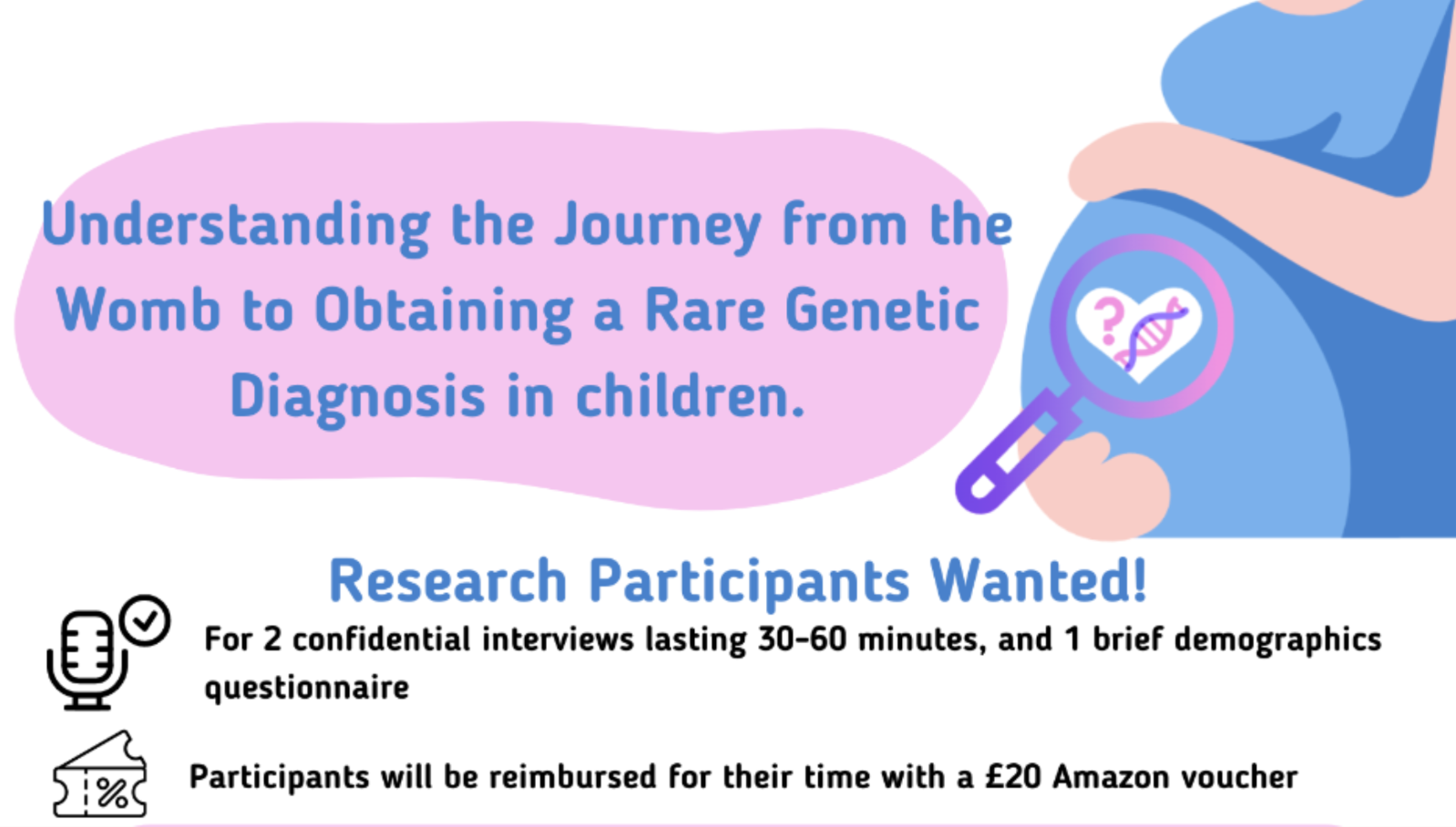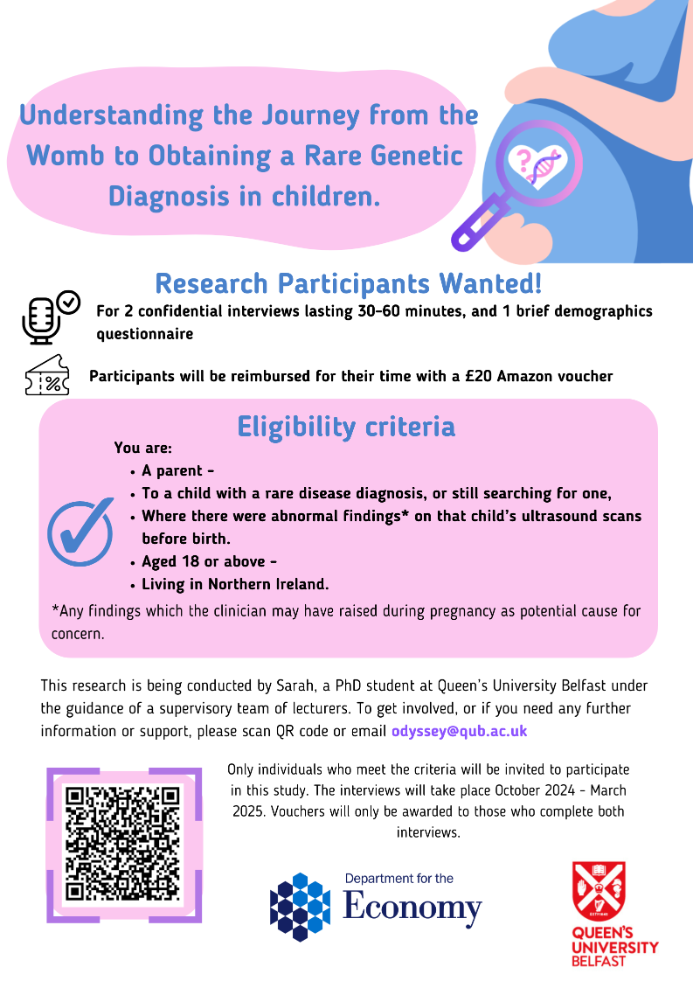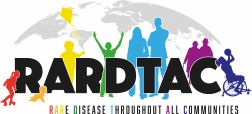Understanding the Journey from the Womb to Obtaining a Rare Genetic Diagnosis in Children.
We are reaching out to find parents of children who have been diagnosed with (or are awaiting diagnosis of) a rare condition having had concerns raised during the ultrasound/s of that pregnancy. Please help others by sharing your experiences!


Parental experience of Diagnostic Odyssey - Participant Information Sheet Project Title
ODYSSEY: Understanding the journey from the womb to obtaining a rare genetic diagnosis in children.
- What is the study about?
You are being invited to participate in a research study because you have experience:
- As a parent,
- Living in Northern Ireland -
- Searching for a diagnosis of a genetic rare disease for your child/children,
- Where there were concerns indicated by the doctor, from the scans during pregnancy - in the antenatal period, before the child was born. These indications will be referred to as your child’s, “abnormal antenatal findings” going forward with the study. The study is being carried out by a team of researchers from Queen’s University Belfast. Please read the following information carefully and feel free to ask the researchers any questions you might have. Contact details are provided at the end of this document.
- How will this Study work?
If you agree to participate and sign the associated consent form, the study will proceed as follows:
You will be invited to complete 1 online survey to gain some demographic information which should take no more than 10 minutes.
You will then be invited to participate in 2 interviews which will be between 30-60 minutes each. They will take place on video-conferencing platform Microsoft Teams and be led by a member of the research group. During these interviews the discussion will be informal and conversational to give you the opportunity to discuss your experiences. The interviews will take place approximately 7-14 days apart. After the first interview you will be given a brief written summary of what was discussed within 7 days. This will give you an opportunity to read over what was said and decide if it is an accurate reflection of your experience. In the second interview you will be able to clarify, change, or expand upon any points from the first interview.
- Why have I been invited to participate?
You have been invited to participate as you have self-identified as fitting the study’s inclusion criteria. Specifically, you are over 18 years of age, and you are the parent of a child with a rare genetic disease, diagnosed or undiagnosed, who had unusual findings on their antenatal scans, and you are living in Northern Ireland. If you feel this is incorrect, please inform the research team.
- Do I have to Participate?
No. It is completely your decision to take part or not. If you decide to take part, you will be required to read and ensure you understand this information sheet, and you will be asked to sign a consent form.
You can also choose to withdraw at any point without needing to provide a reason. However, it is important to note, if you request withdrawal from the study within 14 days of your interview(s) concluding, all of your data will be removed from the study and not used in analysis. If you request after this 14-day period – your data will still be included in the database and analysis. However, it will still be pseudonymised and it will not be able to be linked back to you.
You can withdraw between interview 1 and 2 in the same manner within 14 days. If you need to withdraw between interview 1 and 2 but want your interview data to still be included, it will be analysed as normal.
- Can my Co-Parent be involved?
Your co-parent can also be involved if desired. They may provide additional information for the study, and it may help you feel more at ease to have them present with you. However, they will only be considered for interviewing with you provided they too have experience of your child’s antenatal period. They do not have to be biologically related to the child. We are not interviewing co-parents individually.
- Should my child be present during the interviews?
As the topic is highly sensitive and it may be distressing for your child, we would advise your child to not be in earshot of the conversation. However, we understand your child may be very young, have high support needs, or you may not be able to arrange alternative childcare.
Therefore, it is up to your discretion if your child(ren) is/are in earshot of the Teams call and you are asked to take into consideration the impact on your child’s wellbeing and how you will support them. We would ask in this instance that you wear headphones if possible.
- Are there any risks or disadvantages in being involved?
There are no risks to being involved. However, it is acknowledged that your family time is valuable and taking time out of your busy schedule to participate in interviews can be difficult. It is also noted that discussing your child’s condition may be distressing and you reserve the right to pause, postpone or withdraw from the process at any time.
- What are the possible benefits of being involved?
While there may be no direct benefit to your family there may be a benefit for wider society and for families on the Island of Ireland who face the same challenging journey where a child has a rare disease.
- Will I be compensated for my time?
Yes, participants will be given a £20 Amazon voucher as compensation for their time. Vouchers will only be distributed following completion of second interview.
- What if something goes wrong?
If you have any concerns about any aspects of the study, you can contact Dr Fionnuala Mone, Chief Investigator E: f.mone@qub.ac.uk Should you remain unhappy and wish to make a formal complaint, you can contact the Research Governance Team at Queen’s University Belfast (Telephone: 028 9097 2529; Email: researchgovernance@qub.ac.uk).
- Will my contribution to the study be confidential?
Only members of the research team will know your name or contact details and it will only be those who have direct contact with you. You will be given a unique study ID, which all your interview and demographic data will be stored under to ensure your data is pseudonymised and cannot be linked back to you. Everyone involved in this study will ensure your data is kept safe in accordance with relevant data protection legislation.
Electronic data will be stored securely on QUB servers in encrypted files. Audio-visual recordings of the interview will used to write up transcripts. Once these have been completed and checked for accuracy – recordings will be permanently deleted and only the transcripts will be used in analysis. Contact information will be stored in a password protected file, which will only be accessible by the research team member who is organising and carrying out your interview. At the end of the study, we will archive or store the data securely on QUB OneDrive in case we need to check it for accuracy or use for future research for a period of up to five years. After this point data will be permanently deleted. Your data will only be used for future research provided you explicitly give consent for this when signing the consent form. Otherwise, your data will contribute solely to this study.
This research will be conducted in compliance with data protection legislation. For more information about how we look after your information, how to access your rights and who to contact if you have any queries or concerns about data protection please visit the Queen’s University Belfast website https://www.qub.ac.uk/privacynotice/Research/ListofResearchPrivacyNotices/PrivacyNoticeforResearchParticipants.html
- What will happen to the results from this study?
Findings from the study will be published in international journals, as well as being presented at scientific conferences. We shall provide all participants with a summary of the results at the end of the study, should they agree. The research will be made available in an electronic or digital thesis that is open access. The research will also be made available in forthcoming publications. Our aim is to publish in open access journals, which means they are publicly accessible to all.
Any identifiable information will not be used in publications and if direct quotations are used in publications/presentations these will be anonymous. It will not be possible to identify you from any data included in the thesis or open access publications.
- Who is organising and funding the study?
This research is being conducted as part of a PhD programme at Queen’s University Belfast and is funded by the Department for the Economy.
- Who has reviewed this study?
This study has been approved by the QUB Faculty Research Ethics Committee (REC) for the faculty of Medicine, Health & Life Sciences (MHLS) to ensure it meets ethical standards. In addition, it has been reviewed by external experts to approve strength and validity.
- Who are my main contacts for this study?
Study email - monitored by PhD student conducting the research: odyssey@qub.ac.uk
Principle/Supervising Investigators:
Dr Fionnuala Mone
E: f.mone@qub.ac.uk Address: Centre for Public Health Queen’s University Belfast Block A Institute of Clinical Science Royal Victoria Hospital Grosvenor Rd Belfast BT12 6BA T: +44 (0) 28 9097 6350
Dr Lynne Lohfeld
E: l.lohfeld@qub.ac.uk Address: Centre for Public Health Queen’s University Belfast Block B Institute of Clinical Science Royal Victoria Hospital Grosvenor Rd Belfast BT12 6BA
Thank you for your interest in this study and for taking the time to read through this information sheet.
Media
Contact Sarah Sonner via the following email: odyssey@qub.ac.uk

